41 5 whys and the fishbone diagram
Ishikawa Diagram Or Fishbone Diagram - Studying Diagrams Fishbone Diagram The 5 Whys Tiffany Romo MPH Nicole Vick MPH CHES Linda Quilizapa MSW MPH Fishbone Diagram Page 11 1 What is it. Fishbone Diagram also referred as Cause and Effect diagram or Ishikawa diagram is a fault finding and problem solving tool. Next the technique is visual. It can be used to structure a brainstorming session. Root Cause Analysis, Ishikawa Diagrams and the 5 Whys The Ishikawa diagram should be expanded each time 5 Whys is used. For example, the branch may end up as: material → part not installed → employee skipped operation → work environment too dark → poor lighting → light bulbs burned out. In this example, the use of 5 Whys led to the true cause of the failure - the light bulbs burned out.
How 5 Whys and Fishbone Diagrams Relate to KT Problem ... KT's Problem Analysis approach entails four fundamental process steps. Step 1 is to Describe the Problem, gathering facts to ensure the problem is clearly understood. Step 2 is to Identify Possible Causes, to delineate theories that can be tested against the known facts. Step 3 is to Evaluate Possible Causes, to eliminate false causes from ...

5 whys and the fishbone diagram
Fishbone diagram - Template | Ishikawa diagram - Factors ... (The "5" in the name derives from an empirical observation on the number of iterations typically required to resolve the problem.)" [5 Whys. Wikipedia] This Ishikawa diagram (cause and effect diagram) template is included in the Fishbone Diagram solution from the Management area of ConceptDraw Solution Park. Fishbone Diagram 5 Whys Fishbone Analysis | Five Whys | 5 Whys Template | Root Cause Major causes might include: Processes, machines, materials, measurement, people, environment. Steps of a process (step 1, step 2, etc.) Whatever makes sense. Ask 5 Whys. Begin with the most likely main cause and for each cause, ask "5 Whys." Find the Root Cause (s): Circle one-to-five ROOT causes (at the end of the "5 whys" chain.) PDF The 5 Whys & Fishbone Diagram - Los Angeles County ... Fishbone Diagram & The 5 Whys Tiffany Romo, MPH Nicole Vick, MPH, CHES Linda Quilizapa, MSW, MPH. Fishbone Diagram (Page 11) 1. What is it? •Also known as Cause and Effect Diagram or Ishikawa Diagram •Visually displays multiple causes for a problem •Helps identify stakeholder ideas about the causes of problems
5 whys and the fishbone diagram. Tools of Basic Problem Solving: 5 Why and Fishbones ... Fishbone diagrams are useful in visualizing and categorizing multiple root causes. Also called a cause and effect diagram or a Ishikawa diagram (for its creator, Japanese quality control expert Dr. Kaoru Ishikawa,) fishbone diagrams help teams to brainstorm and focus conversation while avoiding solutions that merely address symptoms of a larger ... What Is A Fishbone Diagram? Fishbone diagrams and 5 Whys can be used individually or together as both can help identify the core of an issue as well as its effect. Allowing to understand the cause and effect relationship, the tools help to quickly identify and react to root causes and additional factors. This improves teams' work efficiency and nurtures strive for ... What Is a Fishbone Diagram? Definition and Full Breakdown ... A fishbone diagram is a visualization diagram that helps compartmentalize and address the potential causes of a lingering issue. This tool is important because it can allow teams to separate the symptoms of a problem from the root issue, and by doing so it can eliminate many problems at once. An alternative way of addressing a fishbone diagram ... Fishbone Diagram Root Cause Analysis 5 Whys - Studying ... A fishbone diagram is a cause-and-effect discovery tool that helps figure out the reason s for defects variations or failures within a process. Five Whys method iteratively asks Why to identify the root cause of a problem. 5 Whys is a practical problem solving questioning technique used to identify cause and effect relationships.
A Review of the Similarities and Difference Between 5 Whys ... Both 5 whys and fishbone diagrams are problem solving tools. The difference between 5 whys and fishbone diagrams are that while 5 whys require asking "why" questions to probe the reasons for an explination to the detailed order possible, fishbone diagrams are graphical illustrations can capture all cause-effect relationships. Very often, fishbone diagrams find use as the tool the represent 5 whys. 5 Root Cause Analysis Tools for More Effective Problem ... The 5 Whys. Fishbone Diagram. Scatter Diagram. Failure Mode and Effects Analysis (FMEA) 1. Pareto Chart. A Pareto chart is a histogram or bar chart combined with a line graph that groups the frequency or cost of different problems to show their relative significance. Cause & Effect: Fishbone Diagram & 5 Why's to Hit Root Cause A Fishbone diagram is a visual problem solving technique used to identify cause and effect relationships. It's used by improvement individuals OR teams to brainstorm and logically organise potential causes. It helps you summarise potential high level causes. It stimulates the identification of deeper potential causes. 5 Whys & Fishbone Diagram Training & Certificate ... Why You Should Register for 5 Whys & Fishbone Diagram Training & Certificate. In the 5 Whys & Fishbone Diagram Training (Single Module), you'll learn the basics of these tools and techniques and continue building your problem-solving muscles. What You'll Get (Certificate, PDUs/CPEs) Fishbone Diagram Template & Example; 5 Whys Template & Example
5 Whys Vs Fishbone Diagram - Studying Diagrams The 5 Whys and fishbone diagrams can be used on their own or as a follow-up to techniques like the last 10 patients chart audit or fall-out analysis. To construct this diagram for a quality of care problem the problem effect is written in a box on the far right of the diagram. However data requirements differ because the former allows ... 5 Whys Fishbone Diagram - edrawmax.com 5-Why is a problem-solving technique that looks at cause-and-effect linkages to find the source of an issue. The process comprises asking questions about the etiology of underlying symptoms and then asking more questions about the answer to investigate deeper. The below 5whys fishbone diagram assists organizations in identifying the root cause of a problem and determining the relationship ... PDF Job Aid: 5 Whys and Fishbone Diagrams - AHRQ The 5 Whys and fishbone diagrams help practices identify obstacles to good performance and what causes them. They can also be used to identify the factors contributing to exemplary performance in order to replicate them. The 5 Whys and fishbone diagrams can be used on their own or as a follow-up to techniques like the "last 10 patients ... Cause and Effect Analysis: Using Fishbone Diagram and 5 Whys The 5 Whys can be used individually or as a part of the fishbone (also known as the cause and effect or Ishikawa) diagram. The fishbone diagram helps you explore all potential or real causes that result in a single defect or failure. Once all inputs are established on the fishbone, you can use the 5 Whys technique to drill down to the root causes.
Root Cause Analysis Course - 5 Whys and Fishbone Diagram ... This course covers the following topics:ObjectivesRoot Cause DefinitionsBenefitsRoot Cause Process SummaryCorrective ActionsProblem Solving Process (8 Steps,...
5 QUALITY TOOLS: FMEA, SIPOC, 5 Whys, fishbone, and ... The 5 whys ("Sakichi Toyoda") Affinity diagram ("Kawakita Jiro") Cause-effect or fishbone diagram ("Ishikawa") SIPOC diagram or Flow diagrams; FMEA; The 5 whys. It is a quality technique developed by Sakichi Toyoda and originally used at Toyota. There are many variations of the method based on reducing from 5 to 4, 3 or 2 questions.
"Fast" Root Cause Analysis: Brainstorming, 5-Whys and ... 5-Whys isn't just simple, it's dangerously simplistic . . . meaning we don't learn very much from the incident. Incidents are seldom the result of a single root cause, and users of '5 whys' are limited to one root cause per causal pathway. Fishbone (Ishikawa) Diagrams. Fishbone employs brainstorming and may also pull in 5-Whys.
Fishbone Diagram Root Cause Analysis - Pros & Cons Fishbone Diagram "Pros". First, let's review the pros of using Fishbone Diagrams for root cause analysis. Let's start with the fact that a Fishbone Diagram is fairly easy to use. Like 5-Whys and Brainstorming (which can be used to develop the "bones") the technique is simple to learn and apply. Next, the technique is visual.
5 Whys - Fishbone Diagram - SmartDraw 5 Whys - Fishbone Diagram. Create 5 Whys examples like this template called 5 Whys - Fishbone Diagram that you can easily edit and customize in minutes. 1/6 EXAMPLES. EDIT THIS EXAMPLE. CLICK TO EDIT THIS EXAMPLE. Text in this Example: Detail Why 2 Why 3 The Problem Why 5 Why 4 Why 1.
Root Cause Analysis - 5Why, Fishbone, 6M The 5 Whys can be also used as a part of the fishbone diagram - a visualization tool that helps to explore all causes of the problem. Once all inputs are established on the fishbone, you can proceed with the 5 Whys technique to drill down to the root causes.
PDF Determine the Root Cause: 5 Whys - CVME 5 Whys and the Fishbone Diagram The 5 Whys can be used individually or as a part of the fishbone (also known as the cause and effect or Ishikawa) diagram. The fishbone diagram helps you explore all potential or real causes that result in a single defect or failure. Once all inputs are established on the fishbone, you can use the 5 Whys ...
5 Whys or a Fishbone diagram for each of the two short ... 5 Whys or a Fishbone diagram for each of the two short-term opportunities. Assignment Content. Root Cause Analysis Now that you have completed a Gemba Walk and have gathered information about the organization and identified opportunities to eliminate inefficiencies, reduce waste, improve a product, or streamline a process, it is time to take a closer look at these problems and get to the root ...
Determine The Root Cause: 5 Whys - iSixSigma The 5 Whys can be used individually or as a part of the fishbone (also known as the cause and effect or Ishikawa) diagram. The fishbone diagram helps you explore all potential or real causes that result in a single defect or failure. Once all inputs are established on the fishbone, you can use the 5 Whys technique to drill down to the root causes.
What is 5M in fishbone diagram? - Morethingsjapanese The fishbone (or Ishikawa) diagram is another way to visualize your 5-why analysis, and allows you to classify your analysis into broad categories. Part 3 of a series on the five-whys. The fishbone diagram, also known as the Ishikawa diagram, is another tool to provide you with a visual representation of your 5-why analysis.
PDF The 5 Whys & Fishbone Diagram - Los Angeles County ... Fishbone Diagram & The 5 Whys Tiffany Romo, MPH Nicole Vick, MPH, CHES Linda Quilizapa, MSW, MPH. Fishbone Diagram (Page 11) 1. What is it? •Also known as Cause and Effect Diagram or Ishikawa Diagram •Visually displays multiple causes for a problem •Helps identify stakeholder ideas about the causes of problems
Fishbone Analysis | Five Whys | 5 Whys Template | Root Cause Major causes might include: Processes, machines, materials, measurement, people, environment. Steps of a process (step 1, step 2, etc.) Whatever makes sense. Ask 5 Whys. Begin with the most likely main cause and for each cause, ask "5 Whys." Find the Root Cause (s): Circle one-to-five ROOT causes (at the end of the "5 whys" chain.)
Fishbone diagram - Template | Ishikawa diagram - Factors ... (The "5" in the name derives from an empirical observation on the number of iterations typically required to resolve the problem.)" [5 Whys. Wikipedia] This Ishikawa diagram (cause and effect diagram) template is included in the Fishbone Diagram solution from the Management area of ConceptDraw Solution Park. Fishbone Diagram 5 Whys










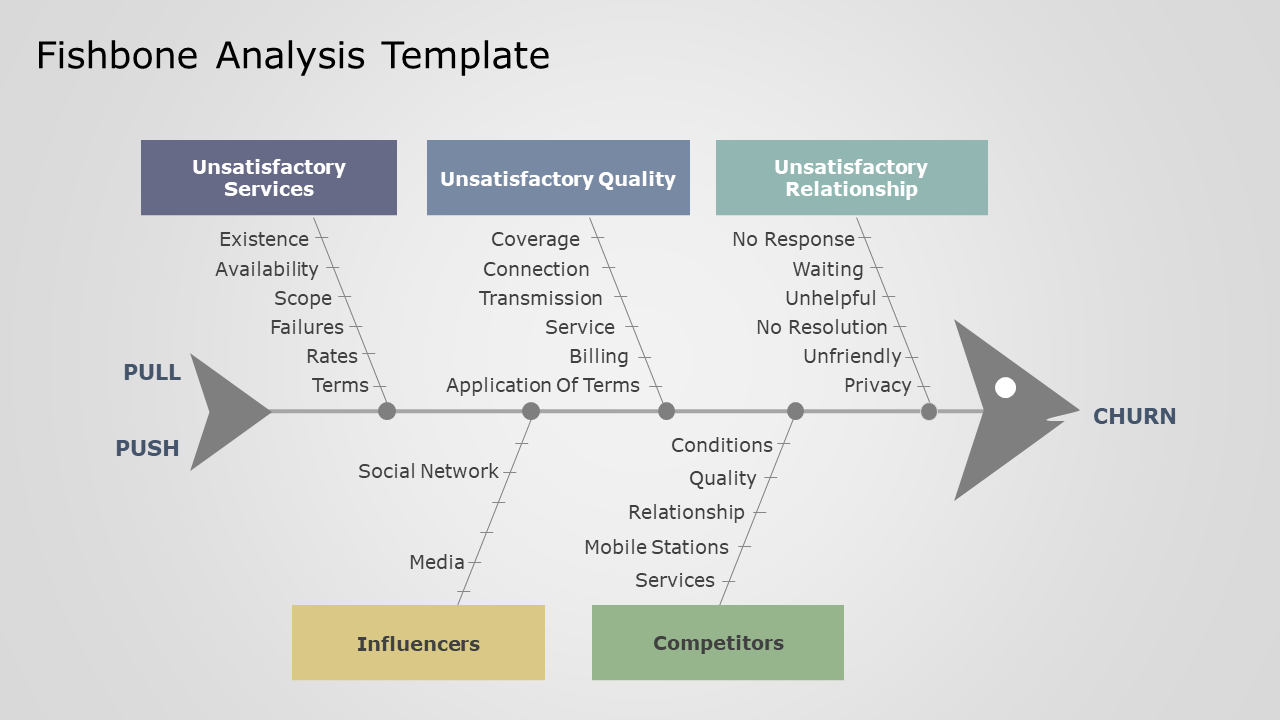
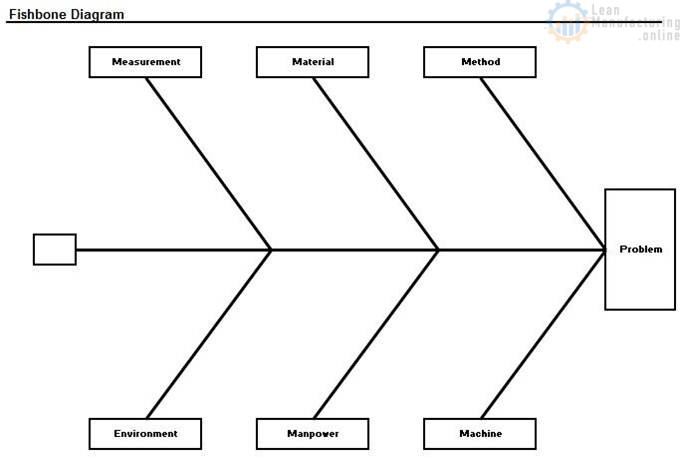





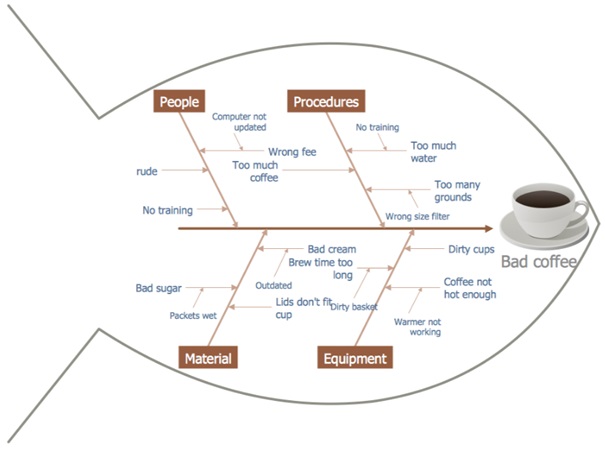
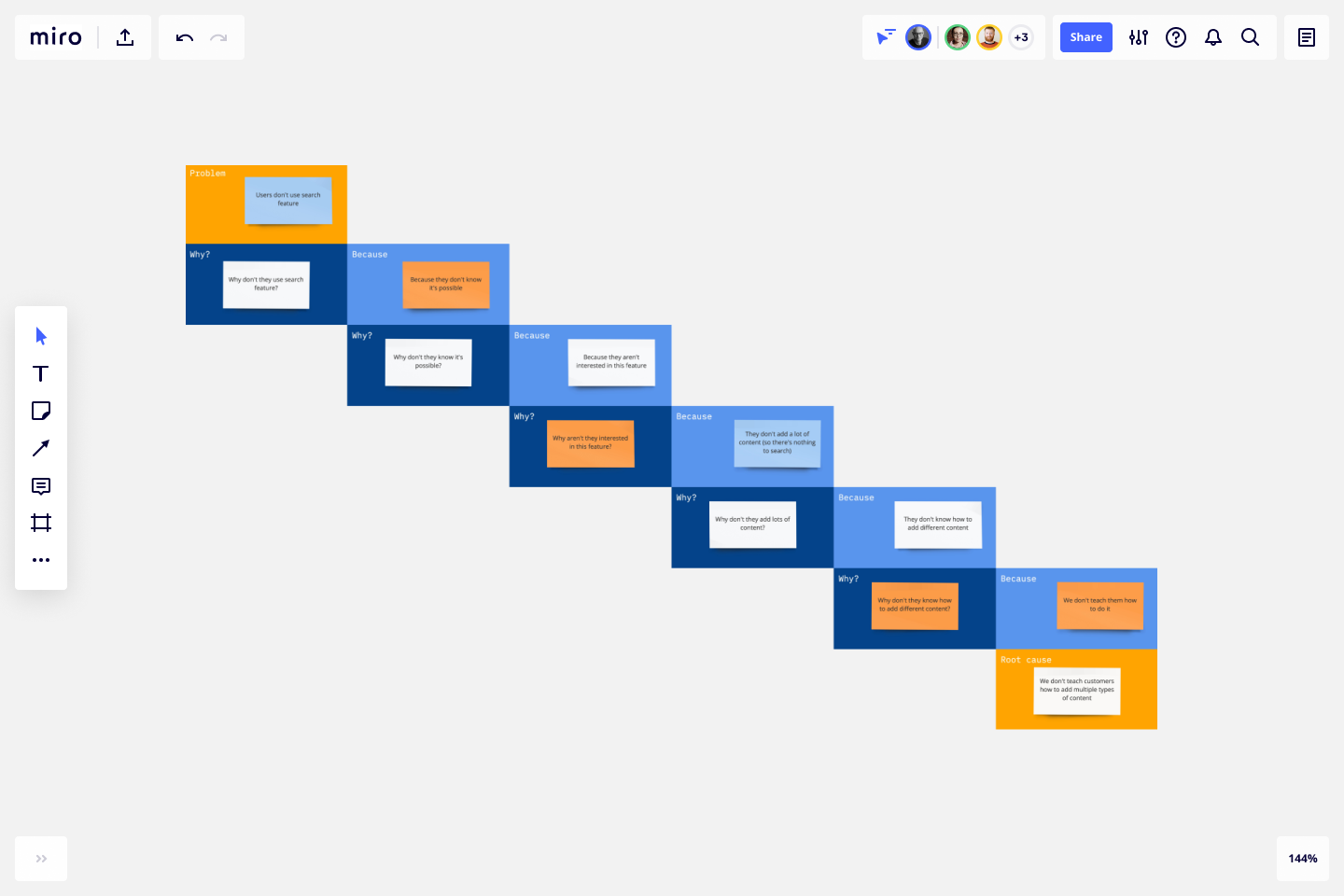

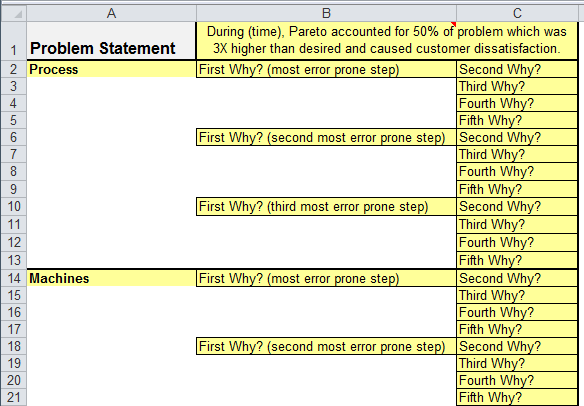
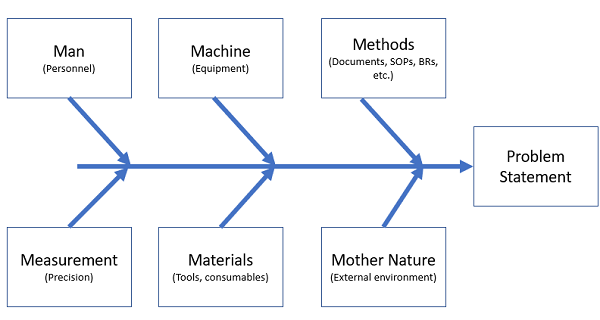
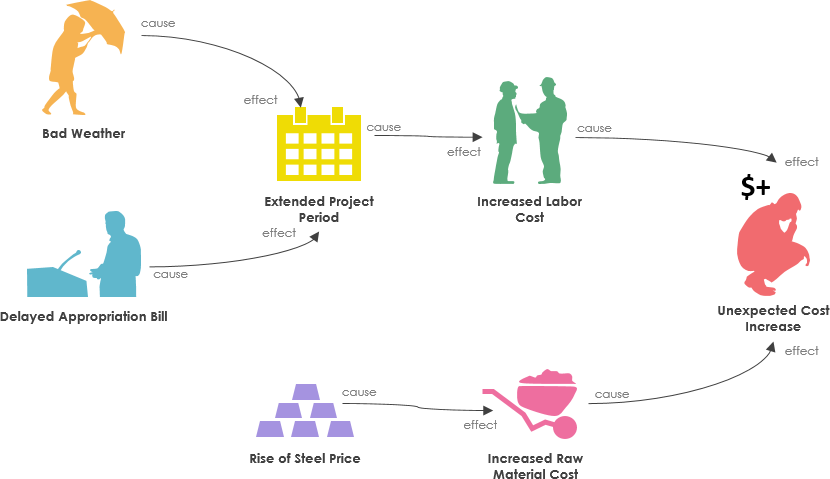

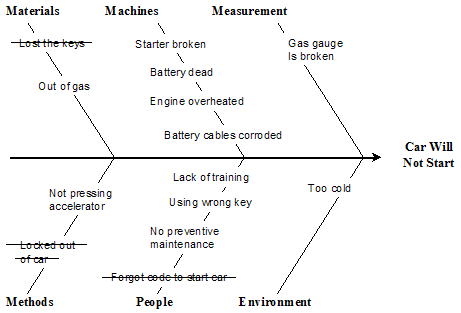

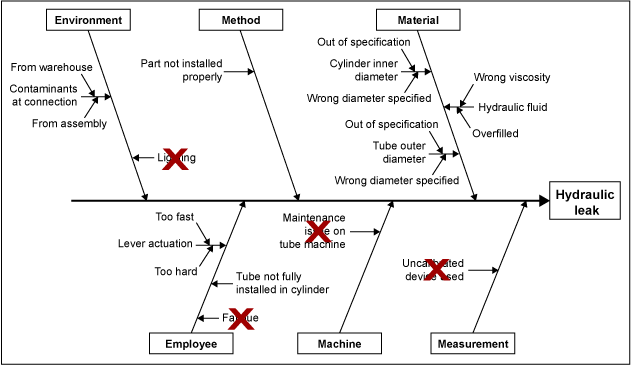

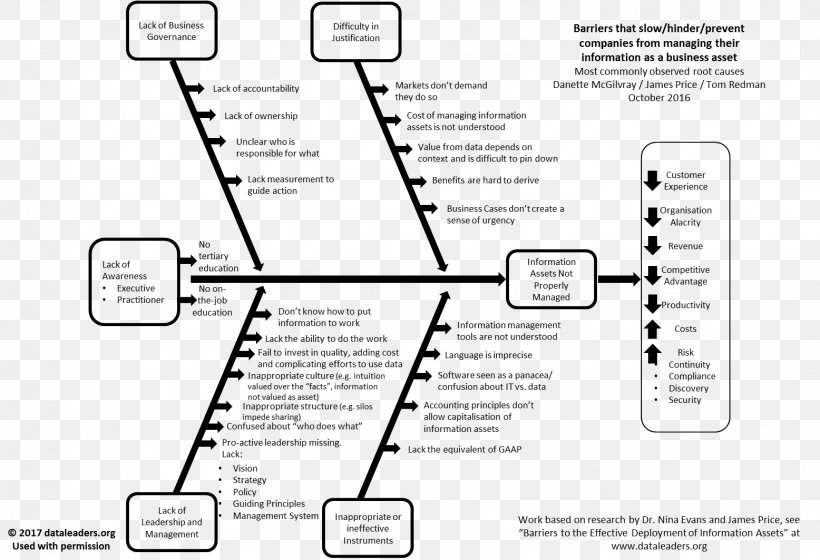



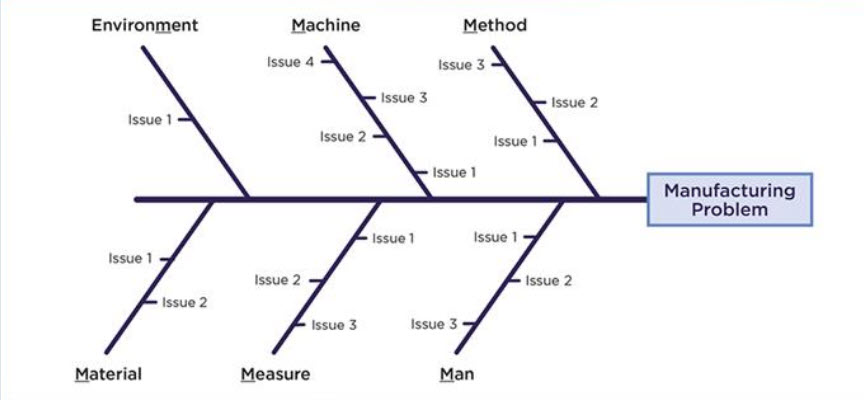

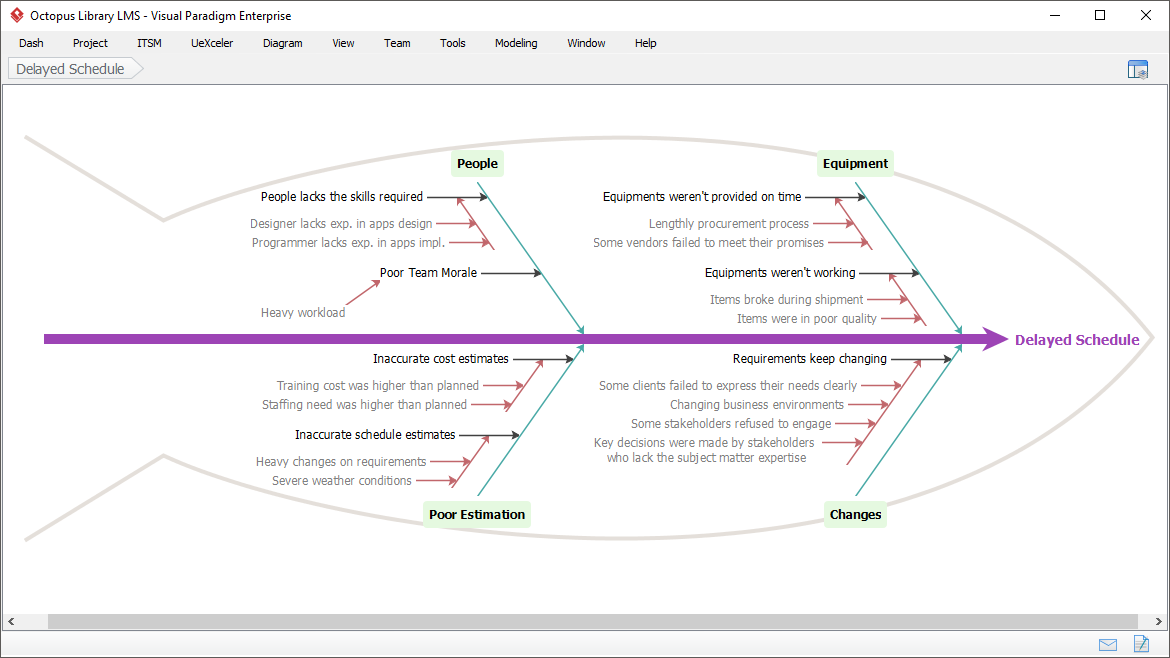


0 Response to "41 5 whys and the fishbone diagram"
Post a Comment